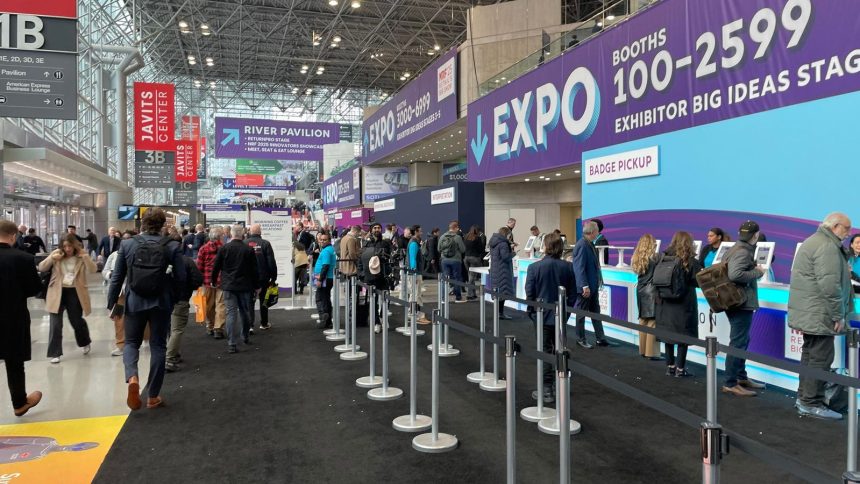The 2024 National Retail Federation (NRF) annual trade show in New York City centered on the transformative impact of artificial intelligence (AI) in reshaping the retail landscape. The event, attracting 40,000 retail executives, technology companies, and vendors, followed what many considered the first AI-powered holiday shopping season, providing a platform for retailers to delve into AI’s potential to drive profits. The conference featured numerous presentations dedicated to various AI applications, with a prominent focus on agentic AI, designed to automate complex customer service and employee tasks. This emphasis underscored the industry’s growing recognition of AI as a vital tool for enhancing efficiency and customer experience.
The opening session, a dialogue between Walmart U.S. CEO John Furner and NVIDIA’s AI lead for retail, Azita Martin, set the tone for the conference. NVIDIA’s recent unveiling of new AI technology for retailers aiming to create AI-powered digital assistants further highlighted the convergence of retail and AI. This discussion, combined with the numerous AI-focused presentations, solidified the NRF’s commitment to exploring and showcasing the latest advancements in AI technology for the retail sector. It emphasized the importance of AI not just as a futuristic concept, but as a currently actionable strategy for businesses looking to gain a competitive edge.
The surge in retailer interest in AI investment was largely driven by compelling holiday season data demonstrating AI’s ability to boost sales and customer engagement. Adobe Analytics reported a significant increase in retail website traffic originating from generative AI chatbots, solidifying their emerging role in consumer purchasing decisions. Moreover, a survey conducted by Adobe revealed a strong positive consumer perception of AI, with a majority of respondents believing that AI enhances the shopping experience. This combination of increased traffic and positive customer sentiment provided tangible evidence of AI’s value proposition for retailers.
Complementing the positive consumer data, retailers were further encouraged by better-than-expected holiday sales results, creating a favorable environment for AI investment. A pre-show NVIDIA survey of retail professionals revealed a substantial increase in AI adoption and pilot projects across the industry. The survey also highlighted the tangible benefits of AI implementation, with a vast majority of respondents reporting increased revenue and reduced operating costs. This overwhelmingly positive feedback from retailers actively using AI further solidified its potential to revolutionize retail operations.
Despite the growing enthusiasm, the survey also identified challenges in AI adoption, particularly the lack of user-friendly AI tools. This underscored the need for technology providers to develop more accessible and intuitive AI solutions for retailers. The survey further outlined the diverse applications of AI across various retail functions, including inventory management, analytics, adaptive advertising in physical stores, and content creation and personalized recommendations in e-commerce. This range of applications showcased AI’s versatility and its potential to impact multiple facets of retail operations.
Adobe’s announcement of its new AI product, Firefly Bulk Create, at the NRF show directly addressed the growing content demands faced by retailers. Designed to streamline the creation and updating of digital content, Firefly Bulk Create aimed to free up creative professionals from repetitive tasks, allowing them to focus on more strategic and innovative work. This tool aimed to empower retailers to efficiently produce personalized and localized content at scale, addressing the previously prohibitive costs associated with such initiatives. The product reflected Adobe’s recognition of the evolving content landscape and the need for retailers to engage customers across multiple platforms with tailored messaging.
Firefly Bulk Create, powered by Adobe Firefly Services, offers a set of APIs for generative AI tasks, such as resizing assets and swapping backgrounds, enabling retailers to apply changes to thousands of content pieces simultaneously. This automation dramatically accelerates content production and reduces the manual effort previously required. Furthermore, Adobe emphasized the commercially safe nature of its generative AI model, assuring retailers of the legal and ethical soundness of the generated content. This focus on commercially safe AI addressed concerns about copyright and intellectual property, providing retailers with the confidence to leverage AI-generated content.
Beyond Firefly Bulk Create, Adobe also showcased other AI tools, including one for translating spoken dialogue into different languages with synchronized lip movements, and another for creating digital avatars for product promotion. These offerings demonstrated Adobe’s continued innovation in applying AI to enhance various aspects of retail marketing and customer engagement. The Innovation Showcase at the NRF, featuring numerous companies presenting new AI use cases, further emphasized the pervasive influence of AI in the retail sector.
The Food Service Innovation Zone at the trade show highlighted the application of AI in automated food preparation and delivery systems. Companies demonstrated robotic systems capable of preparing and delivering food items like pizza and fries, showcasing the potential for AI to streamline food service operations and enhance customer experience. These advancements indicated a broader trend of AI integration across different segments of the retail industry, extending beyond traditional retail operations to encompass food service and other related areas. The NRF show, therefore, served as a comprehensive platform for exploring the multifaceted impact of AI on the future of retail.



